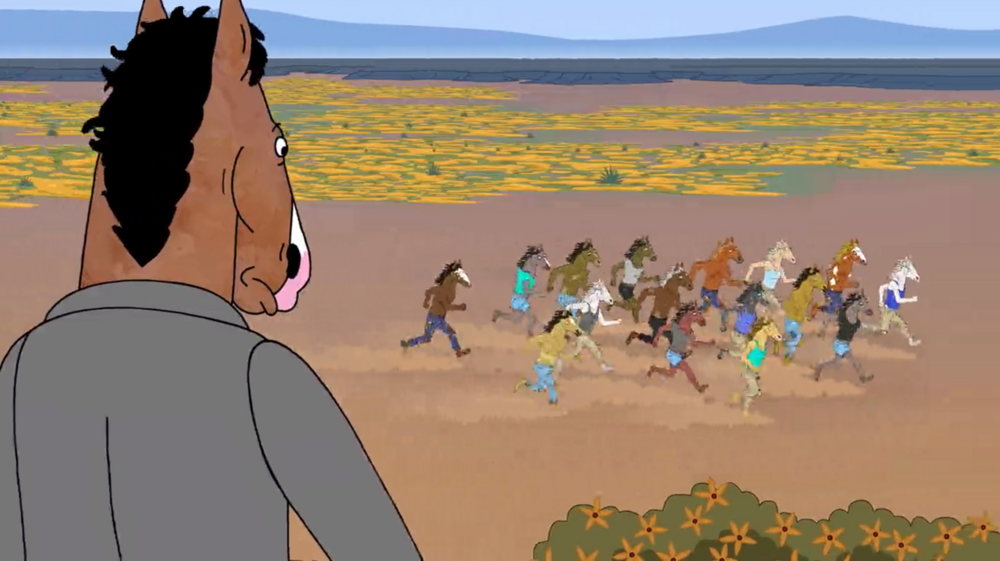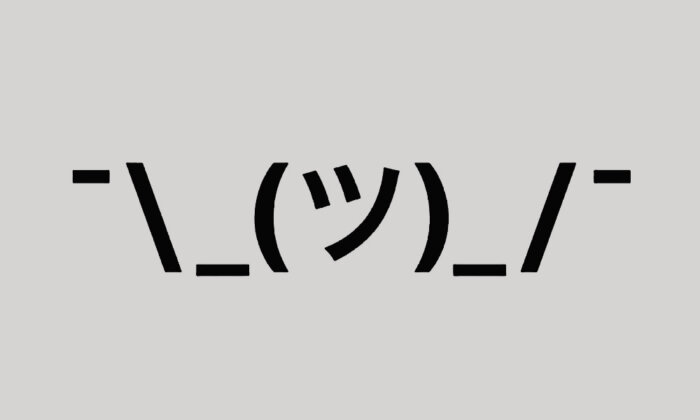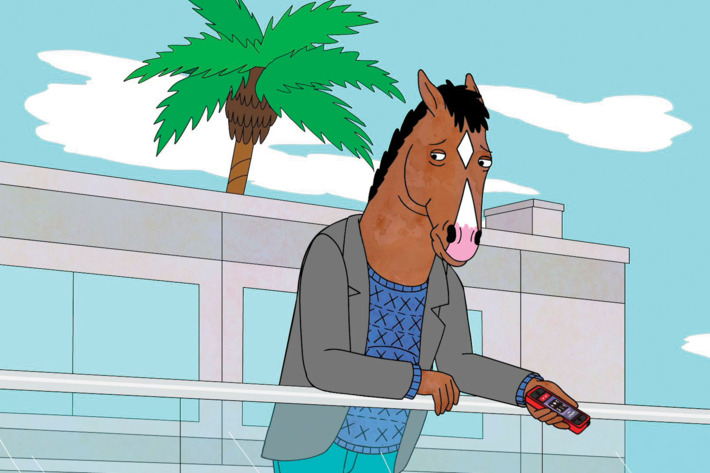By Penny Theodorakopoulou,
Netflix is known for its animated series towards the adolescent-adult audiences — from Disenchantment, Big Mouth, and Paradise P.D., to Close Enough, Rick and Morty and, the protagonist of this article, BoJack Horseman. People do not tend to take “cartoons” seriously, claiming that “it is for kids”. Series like Rick and Morty and BoJack Horseman are way more than just cartoons, their meaning is sometimes so deep, that you actually have to rewatch the episode -even the entire season and/or series-, in order to comprehend what philosophic viewpoint they are based on. In BoJack Horseman’s case, it is existential nihilism.
To be more specific, nihilism is a “philosophy, or family of views within philosophy, expressing negation towards general aspects of life that are widely accepted within humanity as objectively real, such as knowledge, existence, and the meaning of life”. In other words, nihilism is a viewpoint that talks about the senselessness and uselessness of existence — nothing matters, to put it simply. We should make crystal clear that nihilism and realism are completely different things. While nihilism is the negation of meaningful aspects of life, realism is defined as “a doctrine that universals are real — they exist and are distinct from the particulars that instantiate them”. Philosophical realism, to be more exact, is based on the thesis that reality exists completely, no matter how well we know or understand it, so to speak.
Now that we know just what we need in regard to nihilism, let us go back to the topic of this article — the philosophical stance of BoJack Horseman. BoJack Horseman, airing from August 22, 2014, to January 31, 2020, talks about the story of the homonym protagonist, a Hollywood celebrity who was quite famous in the ‘90s for a sitcom called Horsin’ Around and who is trying to regain his former status and glory, while also dealing with depression, drug, and alcohol addiction, whilst struggling to maintain the relationships with those he cares about, even though he continues to hurt them.
As mentioned above, existential nihilism is foundational to BoJack Horseman. If life is truly meaningless, then how are we supposed to deal with it? The series presents to us three ways: by distracting ourselves, radical freedom, and by embracing the Absurd.

Way #1: Distract yourself
A key way to cope with the anguish of a meaningless world is to simply distract yourself. As Mr. Peanutbutter, one of the show’s protagonists, said: “The universe is a cruel uncaring void. The key to being happy is not the search for meaning. It is to just keep yourself busy with unimportant nonsense, and eventually, you will be dead.”. Since the series takes place in Hollywood, a question occurs: if Hollywood celebrities have everything, how can they not be happy? This question was addressed by 17th-century philosopher Blaise Pascal, who is considered by many to be a precursor to the Existentialists. For Pascal, when given too much time to think, humans will eventually contemplate their own insignificance, which inevitably makes them miserable; or as Pascal said:
“I have discovered that all the unhappiness of men arises from one single fact: That they cannot stay quietly in their own chamber. I have found that there is one very real reason, namely, the natural poverty of our feeble and mortal condition, so miserable that nothing can comfort us when we think of it closely.” (Pensées, 139)
In addition to that, humans have a natural psychological defense mechanism that keeps these thoughts at bay: humans are quite easy to be distracted, and when we are distracted, we stop thinking about our existence and can be, if not happy, at least functional. Pascal directly addressed the unhappy celebrity question:
“Yet, when we imagine a king attended with every pleasure he can feel, if he be without diversion and be left to consider and reflect on what he is, this feeble happiness will not sustain him.” (Pensées, 139)
Although BoJack is not a king, the above quote from Pascal still implies on BoJack’s case: He has no serious struggle to occupy his life. Instead, he spends all his time trying to distract himself so that he never has to think about the reality of his situation, hence the addiction to drugs and alcohol. All that changes when Diane Nguyen, ghostwriter and later a friend of his, writes BoJack’s biography called One Trick Pony. In the book, BoJack sees an honest reflection of himself warts and all. He is forced to face all the things he really is and is not and to confront the extent of his self-deception. So, what should BoJack do now that his distraction has crumbled? For Pascal, once you have passed the critical point where diversion will no longer sustain you, the only recourse is to turn to God. However, this is not an option for BoJack. Where are we supposed to turn to, then? For BoJack, the answer is simple: right back to distraction. If trying to reclaim his distracted state is doomed to end in tragedy, what other options does BoJack have?
Way #2: Radical freedom
From the beginning of the series, BoJack rejects responsibility: He wants to escape the realities of his own terrible life choices. After reading Diane’s book, he wants to know that deep down, he is a good person. We encounter BoJack’s fear in 20th-century French philosopher Jean-Paul Sartre as radical freedom, which was a major focus of his philosophy; existentialism. If existentialism had a catchphrase, that would be: Existence precedes Essence. An object’s essence, for Sartre, can be thought of as its purpose. This way of thinking is the same as that of Aristotle. More specifically, an object has potentiality (dunamis) and actuality (energeia), which leads to Sartre’s purpose, entelechy (entelechia). A plank of wood has the potential to be a plethora of things, i.e. a wooden table, chair, or a hammer, which will be combined with metal, whose potentiality can also be any metallic object you can think of. Suffice it to say we have made a hammer. We have created it with a particular purpose in mind, for instance, hammering. We would, in other words, say that the hammer’s essence precedes its existence; for a Christian, a human is like a hammer: a tool created by God with a purpose in mind. But for an existential nihilist, they exist just because. There is no purpose underlying BoJack’s existence and nothing he is meant to do, as well as there is nothing forcing him to do things, either. BoJack has complete control over every action he takes, and that is what Sartre meant by radical freedom:
“That is what I mean when I say that man is condemned to be free. Condemned, because he did not create himself, yet is nevertheless at liberty, and from the moment that he is thrown into this world he is responsible for everything he does.” (Sartre, EIAH)
That means two things: one, yes, BoJack is defined and responsible for all those past choices. No matter what he does, there is nothing he can do to turn back time and not hurt people. On the other side of the coin, however, he is not “doomed to be the person in that book” forever. He has the freedom to change his actions and himself. But it is entirely up to him to do so.

Way #3: Embrace the Absurd
When Mr. Peanutbutter’s brother gets sick, he goes through his own existential crisis, but he does not suffer through it for very long, for he realized that, and I quote, “None of this matters!”. Cuddly Whiskers, BoJack’s old writing partner advises BoJack to give up everything so he can begin to find a way to be happy. Both of their paths to happiness after -or even because- of the realization of nihilism invokes the 20th-century French thinker Albert Camus and his philosophy of absurdism. For Camus, the universe is irrational and meaningless and yet humans are desperate to find reason and meaning in it. This discrepancy is called “The Absurd” in Camus’s philosophy. Once you become aware of The Absurd, you only have three choices: a) return to the cycle of daily life and do not think about it, b) commit suicide or c) rebellion, his preferred option, in which one accepts the Absurd and be happy anyway, for the universe cannot possibly control how one feels. Camus illustrates these ideas in his essay, The Myth of Sisyphus, based on the ancient Greek myth regarding a man who is doomed to push a rock up a hill each day only to watch it roll back down again. Sisyphus becomes Camus’s “Absurd Hero” when he recognizes the absurdity of his task but decides to be happy despite it.
“It happens that the stage set collapses. […] At the end of the awakening comes, in time, the consequence: suicide or recovery.” (Camus, TMOS)
Driving has repeatedly served as a way for BoJack to try to escape the Absurd. Maybe his own take on Secretariat’s advice to “run and do not look back”. But when he releases the steering wheel, BoJack gives in submitting himself to the Absurd and to suicide. However, when he sees the wild horses, they represent for him the alternative: Embrace the Absurd, carry out your meaningless task, and be happy in spite of it.
In conclusion, everyone, even a celebrity, is human. So is BoJack (well, he is not, but you get the point). He is a being with consciousness who was brought up to the world without asking for it — and so did everyone else. Life does not go the way we want it most of the time. On the other hand, life is too short to complain about it and be pessimistic all the time. Instead of trying to distract ourselves or trying to find the meaning of life. As an undergraduate student of philosophy, the first question that I am asked is what the meaning of life is. To that, my answer is simple, which is the same as Camus’s: There is no meaning. Every one of us is trying to find our purpose in life. We are trying so hard to be useful to a society where it will not accept a minor flaw we have (or which is considered as a flaw by our society’s stereotypes and standards). We were brought to a world, either it was a mistake, or our parents wanted a child. It is pointless to spend the few decades of our lives to find the reason we were brought to the world. And remember: Those few decades of our lives were not given to us; we are giving ourselves those decades, with each decision we make every day — to waking up and making our bed, to not having planned that trip we discussed with our classmates back in high school. If we do not like something specific in our behavior, it is up to us to change it, to change us.
References
- The Postmodernism (and Nihilism) of BoJack Horseman, Megan K on Medium, Available here.
- An answer on “What’s the philosophy behind BoJack Horseman?”, Peter Wallace on Quora, Available here.
- In Season Four, BoJack Horseman’s Nihilism Starts to Make Sense. LAMPIN’, Available here.




